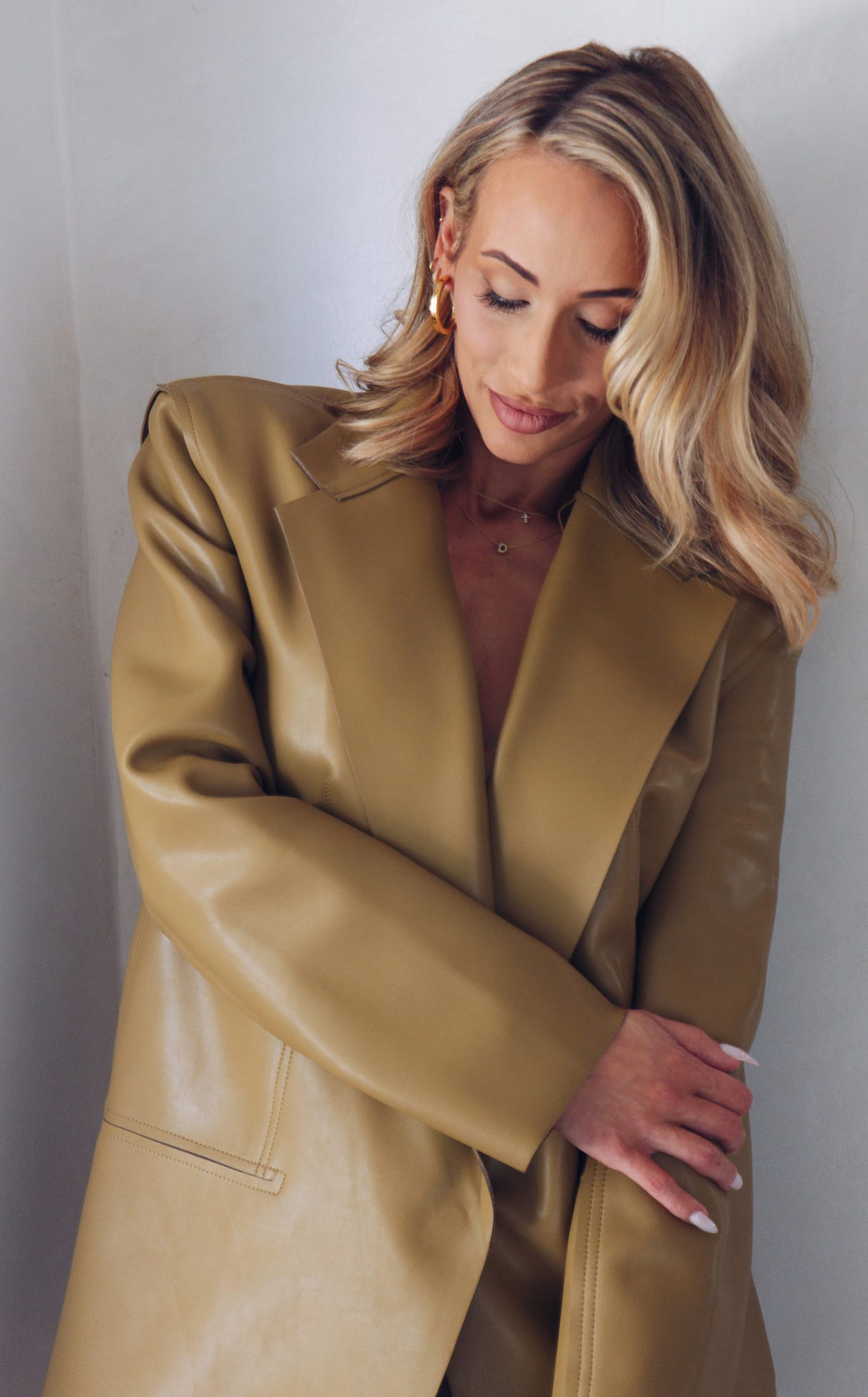Miscarriage Dialogues: WWE Star Leah Van Dale on Loss, Identity & Reclaiming Power After Pregnancy Grief
The professional wrestler, entrepreneur, and founder of Snatched opens up about pregnancy loss, identity after miscarriage & why breaking the silence is the most powerful move of all.
There are stories that shake us—and then there are stories that show us how to rebuild.
Leah Van Dale’s story does both.
You may know her as WWE’s Carmella, the confident, electric performer who spent more than a decade in the ring. But beyond the spotlight, Leah is a mother, a survivor of pregnancy loss, and now—an unflinching voice for the kind of truth-telling that too often gets buried in shame.
In 2022, Leah experienced two devastating losses in quick succession: a miscarriage followed by an ectopic pregnancy that landed her in the hospital. What followed was silence—both from the medical system that dismissed her pain, and from a culture that still struggles to talk about miscarriage in real terms.
So Leah spoke up.
She shared her story publicly—not for likes or headlines, but to say: this happened to me. Her honesty struck a nerve. Because what she described—the confusion, the grief, the isolation, the staggering dismissal of “this is common”—is an experience far too many have lived through, but far too few feel safe talking about.
In this wide-ranging interview for Miscarriage Dialogues, Leah opens up about everything: the emotional aftermath of loss, the trauma of being told to “just try again,” the anxiety of pregnancy after loss, and the complex unraveling—and rebuilding—of identity in motherhood.
She also talks about how loss inspired her next chapter: founding Snatched, a bold new platform that centers postpartum recovery, pelvic floor education, and the real, messy, human experience of pregnancy, birth, and beyond.
Leah’s voice is honest, vulnerable, and fierce—and exactly the kind of voice we need in the miscarriage space. One that doesn’t sugarcoat grief. One that holds space for all of it: the devastation, the hope, the anger, the healing.
Whether you’re in the thick of trying, recovering, parenting, or finding your way back to yourself—this one is for you.
Welcome to the conversation.
You've been so open with your fertility and your pregnancy struggles. Can you take us back to that chapter of your life—what that time was like, and what compelled you to speak out?
The first time I got pregnant, it happened the first time we tried. I was so excited—and a little scared—but I had no idea what to expect. That week was a complete whirlwind. I got a positive test on Saturday, blood work on Monday, and by Friday I started bleeding. It felt like a rollercoaster, and even though it was only a few days, it felt like a lifetime of emotion.
When I asked the doctor what if this happened again, they said it would have to happen a few more times before they’d do any testing. I couldn’t believe it. The idea that I had to go through that again—just to be taken seriously—was devastating. Then I got pregnant again and it turned out to be ectopic. I didn’t even fully understand what that meant. But the back-to-back losses were emotionally crushing.
I decided to talk about it because I knew I wasn’t the only one. If I felt this alone, even with a supportive family, how many other women felt the same? I just hoped that by sharing, I could help one person feel less alone. And it turns out, so many people I knew reached out and said, "This happened to me, too."
In the immediate aftermath of loss, people often say the wrong thing—usually with the best intentions. Was there anything someone said to you that was especially painful or hard to hear?
So many things. Even the doctors. The whole experience felt so sterile and cold. I remember a doctor saying, "Well, at least we know you can get pregnant," and that just felt awful.
During my ectopic pregnancy, I was in the hospital, and my husband was worried about his son's haircut. I was like, "Do you realize what's happening right now? We're losing a baby." But it’s not his fault. We don’t talk about these things. We don’t prepare anyone—men or women—for what to do or say when it happens.
Since then, so many women have reached out to me through my platform. I don’t always know what the right thing to say is—but I know what not to say. And I know how important it is just to hold space for people. Like motherhood, you don’t understand it until it happens to you.
What was pregnancy after loss like for you?
It was scary. After the ectopic, I had to take methotrexate and wait three cycles before trying again. When I did get pregnant, I tried to stay positive, even though I was worried every step of the way. Every cramp made me panic. But I forced myself to speak positivity. That was the only thing I could control.
I know it doesn’t work for everyone, but that mindset helped me get through it. Internally I was terrified, but outwardly I tried to protect that little hope I had.
What was it like to become a mom—to Dimitri? And how has becoming a mother changed your identity?
It changed everything. I feel like that’s all I am right now—a mother. And that’s not a bad thing. I love being a mom, but it’s also overwhelming. I never expected to feel like I lost the version of myself who wasn’t a mom. I’m 37, and sometimes I wonder why I waited so long to become a parent—but I also know this is the exact timing that was meant for me.
I have step kids too, but I didn’t raise them from babies. Becoming a mom from day one is such a shock. They need you, all the time. And I’m learning that to be the best version of myself for my family, I have to take care of me too. When I don’t, I’m not a great wife, mom, stepmom, or friend. Finding that balance is still a work in progress.
As a professional athlete, how has your relationship with your body changed through loss, pregnancy, and now being pregnant again?
My first pregnancy, I was still wrestling and in peak shape. That made it easier to stay active and feel good in my body. Postpartum, I had drop foot from a nerve injury during labor—it was terrifying. No one warns you about that. I could barely walk. As an athlete, that was devastating.
This time around, I got pregnant again 15–16 months postpartum, and it’s just been harder. I don’t feel like myself physically. I’m more anxious about postpartum recovery now than I was the first time. And I hate that there’s so much pressure to "bounce back"—people would say, "You don’t even look like you had a baby." That’s not a compliment. I did have a baby. My body went through hell. I don’t want to erase that.
What was it like to close the WWE chapter of your life after more than a decade in the ring?
Honestly? I wasn’t ready. I wanted to return and prove myself after the injury I got during childbirth. But my contract expired, and they didn’t renew it. I get it—it’s business. But it felt like the last piece of my identity that wasn’t "mom" was gone. That was really emotional for me.
Then I got pregnant again, and it felt like maybe this was the universe forcing me to pivot. I’m pouring that energy into Snatched now. That’s where I’m meant to be. But yeah, that transition was hard. It still is.
What would you say to women navigating miscarriage, infertility, postpartum identity loss, or the uncertainty of trying again?
My biggest advice? Remember: everything is temporary.
When you’re in it—whether it’s postpartum, loss, infertility—it feels like it will never end. But it does. And I wish I’d realized that sooner. The hard stuff is temporary, but so is the sweetness. I missed some of the newborn snuggles because I was so miserable and exhausted. And then one day, I realized he wasn’t lying on my chest like that anymore.
Whatever you’re feeling—it’s okay to feel it. You don’t have to love every minute. But remind yourself that you will get through it. It’s okay to look for the bright spots. And it’s also okay to admit when it’s really, really hard.
Tell us about Snatched—what inspired you to create it, and what can we expect?
Snatched is in-your-face for a reason. People were like, "Do you know what that means?" Yeah—I do. And if that name makes you uncomfortable, ask yourself why. Women’s health should make you uncomfortable if you’re not living it.
Snatched started as a newsletter and evolved into a private forum for women to talk about everything—postpartum depression, IVF, lactation, pelvic floor, identity. We also bring in experts to educate and support the community.
I’m especially excited for what’s next: a six-week prenatal workout program with my trainer Laryssa Lyons, who’s pregnant in the videos. It’s safe, empowering, and pushes back on the "don’t move, you’re pregnant" myth. And in June, we’re launching The First Thirty—a reference-style program packed with expert support for those first 30 days home with baby. It’s everything I wish I had when I was in it. And now I want to make sure other women do have it.
Because we deserve more. Period.
These conversations matter, and so does your voice.
If you have a story to share, an idea to pitch or just want to reach out, we’d love to hear from you. Email us at jenn@milaandjomedia.com or send us a DM at @miscarriagemovement.
Talking about miscarriage shouldn’t feel like a secret. Let’s keep pushing for change—together.





